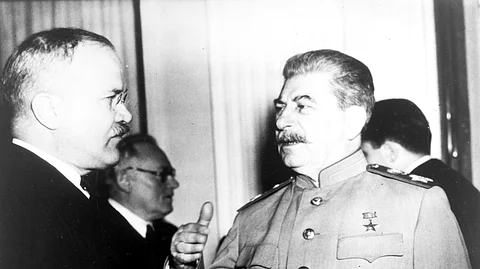

In recent memory, we see many authors and opinions stating that the USSR was simply no better than Nazi Germany because they “together” initiated the hostilities in Europe, and thus, sparking the Second World War, and that moral equivalence between the two authoritarian states is justified and is a matter of fact.
However, critical analysis and logical thinking is required to avoid falling into historical misconceptions and to not engage in spreading of false information.
It addressed the relationship between Nazi Germany and the USSR, this involves the cessation of vilification by both sides to each other through their media outlets, it also involved dividing Eastern Europe into two zones, one zone for German influence and another for Soviet one, and increasing trade between the two states
It is important to note that while the agreement was signed in the 24th of August in 1939, Nazi expansion has been undergoing for some time – including the annexation of Austria and parts of Czechoslovakia and puppeteering the ruined state of Slovakia, and, of course, that Hitler did not hide his desire to eventually expand into the Soviet Union, this was considered an essence of the Fuhrer of Germany, and no one really deluded himself about it.
The agreement between the USSR and Nazi Germany only involved Molotov and Stalin, nobody else in the echelons of the Soviet government were aware of it.
Initially, the USSR tried to join into an agreement with France and the United Kingdom, however, in the Summer of 1939 the UK only sent a middle ranking Foreign Office staffer to Moscow, this was took by Stalin as a sign that the UK was not serious in engaging in any negotiations, meanwhile, the Nazis sent their own Foreign Minister, France was also plainly not interested in reaching a deal with the USSR, considering Stalin always considered himself a “practical” man, in the Summer of 1939 he only had two realistic options, to ally himself with the Anglo-Franco bloc, or to ally himself with Nazi Germany, he chose the latter, Stalin himself did not see a difference between democratic or fascistic Capitalist states, considering them all an antithesis to Communism, he took Lenin negotiating with the Germans in the first world war as an example.
Stalin was not deceiving himself with the weakness of the USSR compared to Nazi Germany in 1939, Molotov that recalled that Stalin thought that the USSR would only be equal to Nazi Germany in military footing only in 1943 – three years in which time was supposedly brought by the Molotov-Ribbentrop pact, or at least that was the intention of Stalin, and he intended to use that time to the fullest, Hitler would later describe Stalin as a “cold-blooded blackmailer”, since Stalin actually insisted on several aspects that were not initially agreed on and drove a hard bargain in terms of cooperation.
The idea that Stalin did not think war with Nazi Germany is impossible is delusional, Molotov recalled in his memoirs that Stalin knew it was inevitable, Stalin also, in a ceremony to graduates of military academies in Moscow, declaring, quote, “War with Germany is inevitable”, and “it will be good fortune [if Molotov can postpone the war for two or three months through the Ministry of Foreign Affairs], he also informed that “attack is the best form of defense, and educate them [Army] in the Spirit of Attack”, however, such plans were only barely sketched when the war with Germany started, Stalin, as a practical man, ensured himself that he had every possibility accounted for.
The reason that Stalin was shocked and did not actually believe that Hitler launched his own invasion is because through the Molotov Ribbentrop pact and through the negotiations, he gave no indication (to Hitler) that he was about to launch an attack, nor did he give Hitler any reason to launch an attack, his diplomatic overtures were tuned to delaying an attack as much as possible, which also meant appeasement and acting mellow in certain situations.
Therefore, the agreement of Molotov-Ribbentrop pact was simply an agreement signed as a practical measure in a diplomatically bleak era of Europe where no other solution or escape was presented, it was simply a measure of statecraft, are the Danes of May of 1939 delusional for signing a similar pact with Nazi Germany, or did they simply try the avenue of statecraft and policy making just to buy some time for their citizens and military staff?
In such a world, everything is by the pen and paper, Molotov-Ribbentrop was no different, such Machiavellian policies are common, and I, as the author, do not equally blame the USSR and Nazi Germany for starting the Second World War, it was already inevitable by 1938, everyone was simply making their measures due.